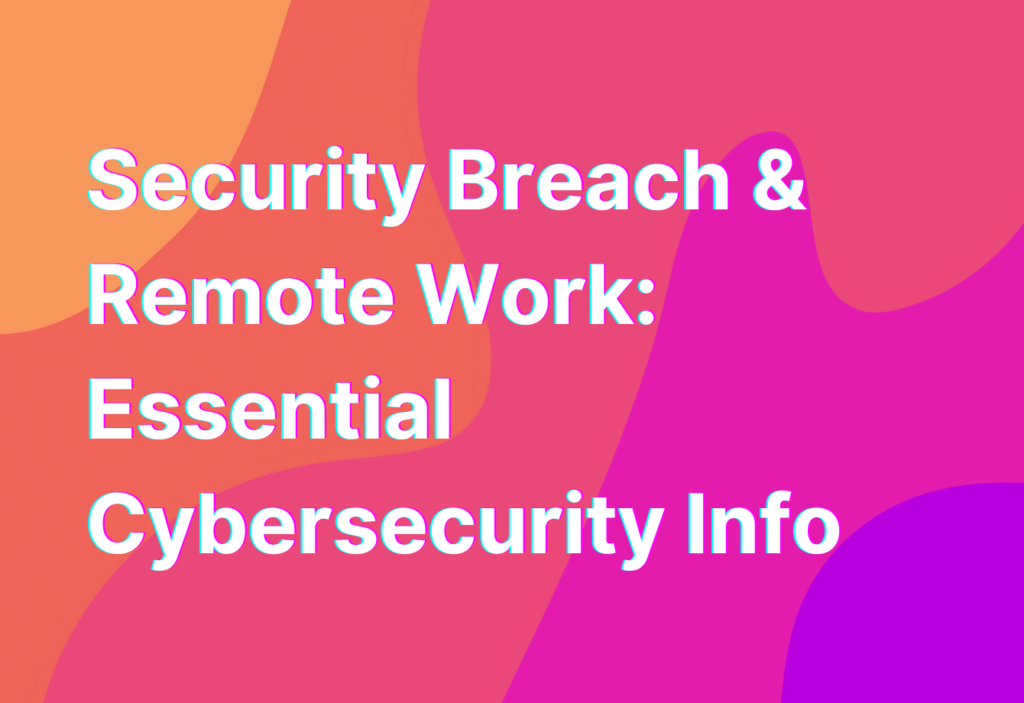Security Breach & Remote Work: Essential Cybersecurity Info
Hey there, remote work warriors! It’s Ashley, your friendly neighborhood remote work advocate, here to talk about a topic that’s crucial for all of us: security breaches. As remote workers, we rely heavily on technology and the internet to get our jobs done. But with great power comes great responsibility, and it’s important to stay informed about cybersecurity to protect ourselves and our work. So, let’s dive in and explore some essential cybersecurity information for remote work.
Understanding Security Breaches
First things first, let’s get on the same page about what a security breach actually is. In simple terms, it’s when unauthorized individuals gain access to sensitive information or systems. These breaches can happen in various ways, such as through malware, phishing attacks, or even physical theft of devices. The consequences of a security breach can be severe, ranging from financial loss to reputational damage.
Now that we know what we’re dealing with, let’s take a look at some key steps you can take to protect yourself and your work from security breaches.
1. Keep Your Devices Secure
One of the first lines of defense against security breaches is ensuring that your devices are secure. This means using strong, unique passwords for all your accounts and enabling two-factor authentication whenever possible. It’s also important to keep your operating system and software up to date, as updates often include security patches that address vulnerabilities.
Remember, folks, a strong password is like a superhero cape for your accounts. So, don’t be lazy and use “password123” as your go-to. Get creative and throw in some special characters, numbers, and a dash of unicorn magic!
2. Be Wary of Phishing Attacks
Ah, phishing attacks, the sneaky little devils of the cyber world. These attacks often come in the form of emails or messages that appear to be from a legitimate source, but are actually designed to trick you into revealing sensitive information. Always double-check the sender’s email address and be cautious of any requests for personal or financial information. If something seems fishy, report it and delete it!
Speaking of phishing, have you heard about spear phishing? It’s like regular phishing, but with a fancy twist. Check out this Spear phishing article for more juicy details.
3. Use Secure Networks
When working remotely, it’s tempting to connect to any available Wi-Fi network. But beware, my friends, for not all networks are created equal. Public Wi-Fi networks, in particular, can be a breeding ground for hackers. Whenever possible, use a virtual private network (VPN) to encrypt your internet connection and protect your data from prying eyes.
Remember, it’s better to be safe than sorry. So, resist the urge to connect to “FreeWi-Fi123” and opt for a more secure option instead.
4. Backup Your Data
Imagine this: you’re working on an important project, and suddenly your computer crashes. Panic sets in as you realize you haven’t backed up your work. Don’t let this be you, my friends! Regularly backing up your data is essential to protect against data loss in the event of a security breach or hardware failure. Whether it’s using cloud storage or an external hard drive, make sure you have a backup plan in place.
Trust me, folks, backing up your data is like having a safety net for your work. It’s like having a backup parachute when you’re skydiving – you hope you never need it, but it’s there just in case.
5. Stay Educated and Vigilant
Cybersecurity is an ever-evolving field, and it’s important to stay educated about the latest threats and best practices. Keep an eye out for news and updates from reputable sources, and don’t hesitate to reach out to your IT department or a cybersecurity professional if you have any concerns. Remember, knowledge is power!
Alright, my fellow remote work warriors, we’ve covered some essential cybersecurity information to help protect ourselves and our work from security breaches. By following these steps and staying vigilant, we can navigate the digital world with confidence and peace of mind. Stay safe out there!


